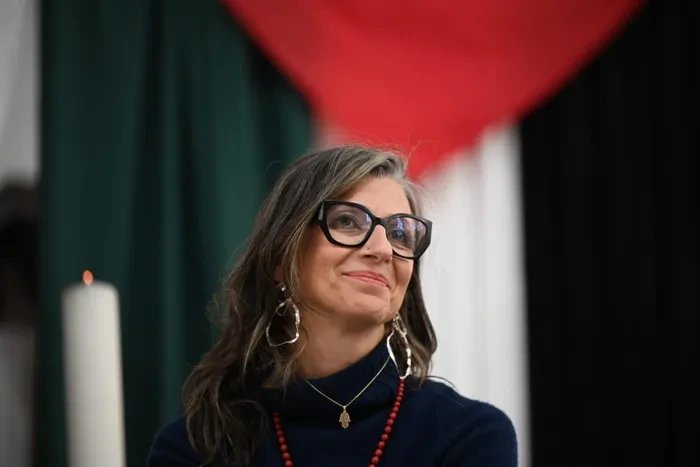How South Africans reproduce apartheid’s most dangerous habit

THERE is a particular theatre to South African political life: we know how to gather, how to convene, how to fill auditoriums when history arrives clothed in urgency.
We clap where we should clap. We nod with seriousness. We ask familiar questions with grave voices. And then we go home feeling as though participation is enough.
On Sunday, as Francesca Albanese spoke, something in the room felt familiar — a choreography of solidarity, ritualistic and almost liturgical. People repeated what we already know: BDS matters; sanctions work; we must “raise awareness”; what can we do?
There is earnestness there, yes, and a beating heart. But there is also a performance economy — an economy of optics that governs public conscience like a currency traded at a premium.
South Africans have built an identity on moral memory. We invoke ’94 like scripture; we rehearse the vocabulary of liberation like catechism. However, too often, the memory becomes the mask. It is easy to say “Not in our name” when the world already expects it.
It is harder to move from memory to material action — to recognise that being anti-apartheid in 2025 is not radical, it is the minimum entry requirement for dignity.
In that room, watching Francesca Albanese speak, I realised the questions rarely change not because we lack information, but because we cling to the performance of inquiry. We keep asking: What can we do? as though we do not already know.
This is the comfort of optics: solidarity as ritual, not responsibility.
South Africa often positions itself as a moral witness, but witness without consequence is not solidarity — it is spectatorship. We condemn the occupation, we denounce genocide, we mourn Gaza, but we also consume it. We share images like devotional icons. We circulate grief as currency. We flood timelines with vocabulary that soothes us into believing we have acted.
In the economy of optics, participation substitutes for commitment, and grief becomes theatre.
And then, there is the UN. We must name the farce plainly: a structure that watches genocide and calls it procedure. A bureaucracy where veto power, that relic of imperial spoils, is treated as natural law. A club where the colonial architecture is not only preserved but congratulated for its longevity.
The UN is not broken — it is functioning exactly as designed. It observes. It reports. It debates. It invites the arsonist to comment on fire safety. It normalises relations. It issues statements like confetti while states bulldoze lives.
We pretend this is internationalism; in truth it is administrative coloniality — a system built not to stop power but to sanctify it.
Francesca Albanese spoke with clarity and courage, but the room — we, the audience — must interrogate ourselves. We have turned exceptional dissenters into icons, polished them with reverence until the sheen becomes a distraction.
These questions ring loud in my ear:
How do you navigate the idolatry and hero-worship — especially from liberal, often white audiences who convert moral courage into a spectacle? Does this adulation depoliticise the struggle you represent?
We sanctify figures like her because sanctification feels like action. But icons can domesticate struggle. Hero worship is a soft politics — it validates emotion without demanding confrontation.
What we all know but rarely admit:
How does the UN claim legitimacy when veto power replicates global settler logic? How does one speak truth within an institution structured to mute it?
And when Francesca Albanese framed Palestine through colonial erasure rather than occupation, she did what the UN refuses to do — name power as power. That vocabulary matters. It pierces the myth of neutrality that international law hides behind. Words can be weapons. Words can also be shields. Law has long chosen the latter.
So what remains for us — here, in South Africa — a country that holds liberation memories like inherited scripture?
Memory is not enough. Sympathy is not enough. Watching is not enough. There is no virtue in being historically adjacent to struggle if we only perform its remembrance.
To “stand with Palestine” cannot mean to simply attend the talk, post the quote, wear the keffiyeh at the right conference. Liberation is not a brand identity. It requires cost. It requires risk. It requires material consequence — not just moral posturing.
The real question is not What can we do? But what are we afraid to do?
Whose comfort are we protecting when we ask safe questions?
Whose illusions do we preserve through politeness?
Solidarity is not an optic — it is a disruption.
It is noisy, uncomfortable, and often isolating.
It pulls reputation apart rather than polishing it.
South Africa remembers apartheid so that we might not repeat it — and yet we reproduce its most dangerous habit: believing moral clarity is the same as moral action.
History will not absolve spectatorship, even when spectators cheer for the right side.
Liberation requires more than applause.
It demands consequence.
And the theatre of solidarity must give way to the labour of it.
Otherwise we are simply watching.
Khan is a fellow at the Centre for Humanities Research at the University of the Western Cape.



0 Comments